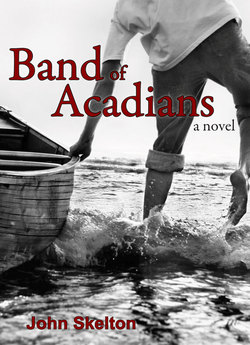Читать книгу Band of Acadians - John Skelton - Страница 9
На сайте Литреса книга снята с продажи.
Оглавление3 Tatamagouche
Once out on the water, the ravenous crew consumed the fish stew.
“I’ve never seen a meal eaten with so much gusto in my life,” Jocelyne said. “I guess all our hard work and relief at getting away made everyone extra hungry.”
Although the sails on the rafts weren’t efficient, they were definitely better than using oars alone. Hector said that should a raft begin to stray from the main group a towline would be extended from a shallop to tow them back.
It was a fitting reflection of the travellers’ mood that a beautiful evening greeted the flotilla’s first few hours back at sea. Several boys demonstrated their glee by diving into the frigid depths and splashing a few girls dangling their legs in the water — antics that sparked merriment all round. The cold water soon forced an end to this pleasant interlude, but the good cheer persisted.
Nola approached Frank after this little frolic to ask if he would convene their first language lesson. Noting there was nothing to write on, and concerned the dim light given off by their raft campfire would be insufficient for the task, Frank asked for suggestions. Grandpa overcame his wariness about taking lessons from this foreign youth and told him the Mi’kmaqs used the inside part of birch bark to draw messages. So, he suggested, since they had birch firewood on the raft, this technique might do. Several fugitives began to peel the bark from the birch logs. Such writing had to be done in two stages: they had to mark the bark with a knife, then fill these marks with ashes from the firepit. This method, though cumbersome, proved functional, especially after they piled a few more logs onto the fire to brighten the light.
Frank started the lesson by writing and pronouncing each letter of the alphabet in French and English and then asked everyone to repeat the letters and write them. After this exercise, he asked each student to write his or her name. Nola was absolutely thrilled when, in just over two hours, she succeeded in scrawling her name shakily.
“This is wonderful,” she said. “I’ve wanted to write my name since I was a little girl. Father Daubin never taught us any of this. He mostly recited stories and songs from the Bible, which are certainly lovely. We had to learn many of them by heart. My favourite hymn is ‘Ave Maris Stella.’ It’s beautiful, but I don’t understand a word of it because it’s in Latin. Now at last I am on my way to being able to write. Thank you for this amazing gift, Frank.”
After the lesson, when the conversation turned to their travel itinerary, Grandpa said it was about fifty miles to Tatamagouche. At their current pace that meant they should reach that town in less than two days. They had enough water and firewood to last until then, so there would be no need to go ashore.
“That’s good,” Hector said, “because if we can stay five miles or so offshore, we’re less likely to be discovered by patrols.”
At about midnight three boys in the lead shallop — Remy, Joseph, and Pierre — spied several large seals basking in the water. They asked Hector if they could borrow the bayonets seized from the three soldiers during the isthmus fight.
“If we could tie a bayonet to a pole, we could hunt those seals,” Remy said. “It would be good to catch one. We could use the hide to make shoes, blankets, and other things we need. And seal blubber can be used as lantern oil.”
This argument convinced Hector, and he agreed to let them have the English weapons. “Just don’t lose them,” he cautioned.
The next morning several girls, who were shy about having so many boys about them all the time, decided they wanted to be on their own raft. “Some of those boys are entirely too curious about us,” said one girl. “We need more privacy.”
“Go ahead. Make the switch if you’ll be more comfortable with that arrangement,” Hector said.
They approached Tatamagouche near dusk in a good frame of mind until they got a closer look at the town.
“Oh, no!” cried Jocelyne. “Every building’s been burnt to the ground, even the church.”
“Over there,” Nola said. “There are dozens of new mounds in that cemetery. At least they took the time to bury the dead.”
Grandpa remarked that he had heard about some towns being ransacked before the expulsion at Grand Pré but hadn’t believed it. “Now I see it was true.”
Frank was shocked. “I’ve been told that war is horrible. Now I see horrible in real life. Everything here is in total ruin.”
